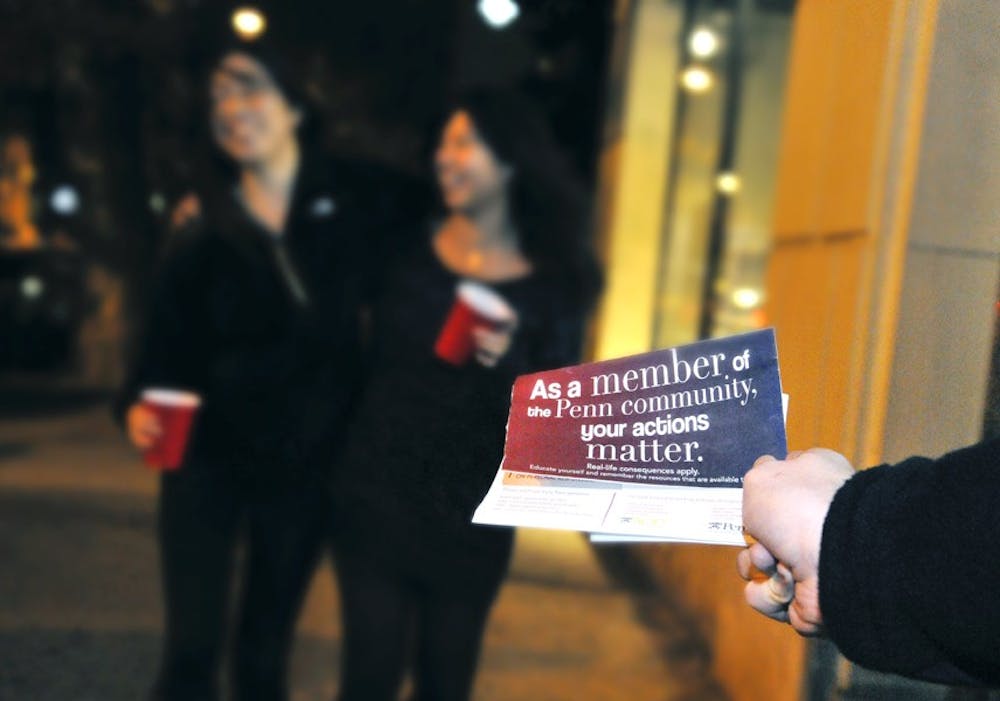
The Division of Public Safety and the Office of Alcohol and Other Drug Program Initiatives received a $25,000 grant to fund alcohol education related to off-campus parties.
The money, granted by the Pennsylvania Liquor Control Board to about 60 state organizations, is paying for overtime for Penn Police officers on five high-risk weekends throughout the school year for the next two years. As part of the grant, Penn is required to pay an additional $6,250 of its own money to support the program.
The high-risk weekends include New Student Orientation, Spring Fling and the weekend nearest to Saint Patrick’s Day. The only weekend during which the grant money has been implemented so far has been Halloween.
Related: Undercover officers to patrol Spring Fling
As part of the program, officers are stationed on street corners and sidewalks nearby parties and hand out educational materials to students as they pass by.
“This has been really well received by students so far. They’ve been very receptive and thankful for the information on how to keep themselves safe,” said Captain of Patrol Operations Joe Fischer, who is responsible for implementing the program with the Penn Police.
“We advise students on the school’s code of conduct, what is expected of them, what resources are available on campus, as well as what the legal ramifications are in different scenarios,” Fischer said.
“This is not a huge change from what we’ve already been doing, but it allows us to concentrate our financial and human resources toward this effort,” Vice President for Public Safety Maureen Rush said.
Related: Liquor control officers to patrol Made in America
When addressing students, the officers hand out educational information, including a postcard listing available resources for students and news articles from the Daily Pennsylvanian and the Philadelphia Inquirer related to alcohol incidents in the past.
“A lot of young people — when adults in uniform talk to them about the potential negative consequences of drinking — often have a sense that it couldn’t happen to them,” AOD Director Julie Nettleton said. “It’s there to solidify that this stuff actually happens. This is real.”
AOD is responsible for the creation of the educational paraphernalia, while DPS focuses on the use of officers to engage with students in the education process.
“Over the past few years, it’s been obvious that we need to be engaging the students that live off campus in a more proactive way. We’ve gotten very good at responding to issues, but in the last year or so we’ve focused even more on the prevention front,” Nettleton said.
AOD is in the process of creating a pamphlet for landlords to provide to students when they pick up their keys in the fall of each school year, describing the ramifications of alcohol use and dispense and resources for students seeking help.
“We also have preemptive conversations with the hosts of parties that appear to be in danger of breaking the law,” Fischer said. “We explain the responsibilities of throwing a party, like how to identify when someone needs medical attention. If there is something life threatening happening, we do not want them to ignore that.”
“It’s our expectation that they will manage these parties properly,” he said.
Related: Liquor store opens at 43rd and Chestnut
According to AOD and DPS, in the past year, the Bureau of Liquor Control Enforcement has been cracking down on underage drinking on college campuses.
“The potential of presence has helped curb high risk behavior, but their enforcement is very real, and they can come in at any time,” Nettleton said. “We want to tell students what they can do to protect themselves and their futures.”
“This is one more tool in our toolbox we now have to try to keep our community safe,” Rush said.
The Daily Pennsylvanian is an independent, student-run newspaper. Please consider making a donation to support the coverage that shapes the University. Your generosity ensures a future of strong journalism at Penn.
DonatePlease note All comments are eligible for publication in The Daily Pennsylvanian.







